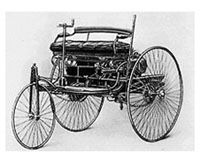Pondering the Justification for the Federal HIT Push of EHRs
The real question is whether today’s EHRs represent improving healthcare through technology.
The optimist sees the glass as half full.
The pessimist sees the glass as half empty.
The engineer sees the glass as twice as big as it needs to be.
The scientist asks - Why a glass?
This week continues a dissection of David Blumenthal's recent articles in the New England Journal of Medicine describing the Federal Health Information Technology (HIT) initiatives from the perspective of the scientist. Blumenthal states that EHRs (whatever they are) should be adopted and used in a meaningful way. He defines meaningful as used "to improve health and healthcare." He offers two justifications for this initiative. The first echoes the pioneers in the field 50 years ago who had "a conviction that information technology could ... improve healthcare..." The second is that there are factors that have impeded the adoption of HIT and which can only be overcome by the application of government remedies.
It's hard to deny the first justification. Computer technology has, and will continue to, improve healthcare in many ways. The real question is whether today's EHRs represent one of those ways. Hard evidence that the currently available EHRs are part of the problem (not part of the solution) comes in two forms: 1.) numerous projects have failed and continue to fail outright, exceed their budget and are difficult and inefficient to use; and 2.) the rate of adoption of these systems has been "slow" - one could argue justifiably slow. Individuals without medical training or who have never used an EHR may not appreciate that these facts are evidence. They come from a culture where success is judged by market share, ratings, corporate valuation, and statements by pundit-cheerleaders. The fact that a product is on the market, especially if produced by a large company, is all the evidence many need to conclude that "slow adoption" must be the fault of backward, timid practitioners who are behind the times.
The second justification is highly suspect. It's naive to assume that simply because computer-based EHR seems like a good idea in the abstract, that today's EHRs should become a government remedy to whatever ails healthcare. Has it never occurred to those who hatched this idea that the "slow adopters" might know something the politicians, bureaucrats, and committees populated by people with a vested interest in the status quo do not know? - that the majority of the systems available today are mediocre at best and don't offer enough potential to "improve healthcare" to justify the effort and expense they require. Any committed practitioner can institute simple procedures in their office that will deliver many of the key benefits claimed for EHR in an incremental and inexpensive way, and many have.
Before one can suggest that an “electronic” health record is a solution, there must be clarity about what a health record is. How, when, and why should records be kept at all? Do all circumstances require the same type of record? Should all types of records be stored in the same way and in the same place? Kept for the same length of time? Who needs access to what? Under what circumstances? Merely calling for interoperability is not sufficient. What information needs to be communicated to others? In what form? Under what circumstances?
There is a long list of questions that can be asked and should be answered before making a relatively irrevocable decision about what an EHR should be. I'm sure that those of you that currently use an EHR have had your doubts and have thought about some or all of these questions in one way or another. Have those who are making the regulations?
Imagine how rudimentary would cars be today if “meaningful use” and certification criteria for automobiles had been legislated in 1888 after Benz sold his first car, or even in 1938 (50 years later.) With EHR technology only 50 years old, today's EHRs exhibit a level of technical advancement that puts them about on par with the 1938 Buick pictured below. Do we really want to chain ourselves to such archaic technology for years to come? And if we do, will that turn “slow adopters” into rapid adopters?

1888 Benz (Courtesy: Wikipedia)

1938 Buick (Courtesy: Wikipedia)

2015 Acura Hybrid (Courtesy: New York Times)
Find out more about Dan Essin and our other Practice Notes bloggers.
Asset Protection and Financial Planning
December 6th 2021Asset protection attorney and regular Physicians Practice contributor Ike Devji and Anthony Williams, an investment advisor representative and the founder and president of Mosaic Financial Associates, discuss the impact of COVID-19 on high-earner assets and financial planning, impending tax changes, common asset protection and wealth preservation mistakes high earners make, and more.